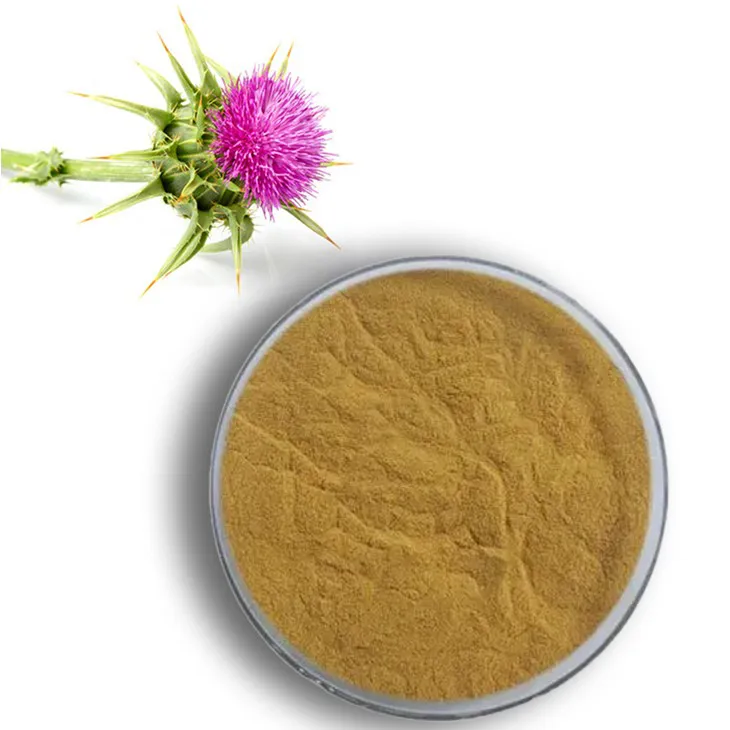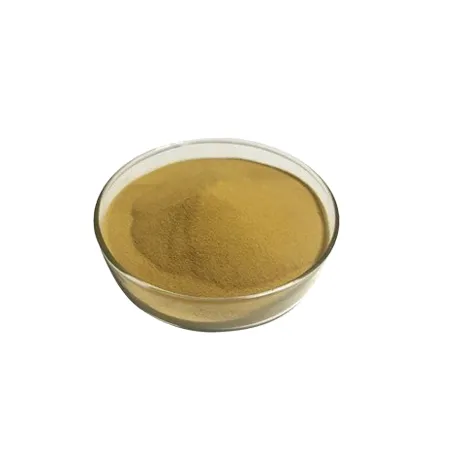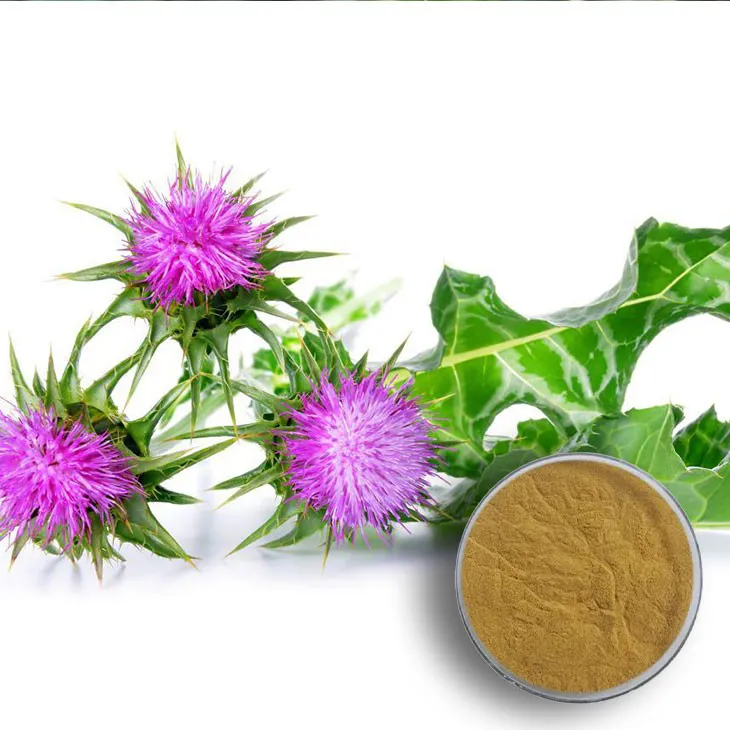- 0086-571-85302990
- sales@greenskybio.com
Is milk thistle extract beneficial for diabetes? Are these all safe and applicable for diabetic patients?
2024-11-14

1. Introduction
Diabetes has become a global health concern, with a significant impact on the quality of life of patients. As a result, there is an increasing interest in exploring natural remedies that can complement traditional diabetes management. One such natural product that has attracted attention is milk thistle. Water - soluble extracts from milk thistle have shown potential benefits for diabetes. This article aims to comprehensively analyze these potential benefits and also evaluate the safety aspects, especially in relation to diabetic patients who may have other concurrent health conditions or be on multiple medications.

2. What is Milk Thistle?
Milk thistle, scientifically known as Silybum marianum, is a plant native to the Mediterranean region. It has been used in traditional medicine for centuries. The most important component of milk thistle is silymarin, which is a complex of flavonolignans, including silybin, isosilybin, silydianin, and silychristin. Silymarin is believed to be responsible for most of the potential health benefits associated with milk thistle.

3. Potential Benefits of Water - soluble Milk Thistle Extracts for Diabetes
3.1 Regulation of Blood Sugar Levels
One of the main potential benefits of water - soluble Milk Thistle Extracts for diabetes patients is in the regulation of blood sugar levels. Some studies have suggested that silymarin can influence the metabolism of carbohydrates. It may enhance the uptake of glucose by cells, which in turn can help in reducing blood glucose levels. For example, in some in - vitro and animal studies, silymarin has been shown to stimulate the activity of enzymes involved in glucose metabolism, such as glucokinase. This enzyme is important in the first step of glucose metabolism in the liver, and its activation can lead to an increased uptake and storage of glucose, thus helping to lower blood sugar levels.
3.2 Improvement of Insulin Sensitivity
Another significant potential benefit is the improvement of insulin sensitivity. Insulin resistance is a common problem in type 2 diabetes. Silymarin may act on insulin signaling pathways in cells to make them more responsive to insulin. In some research, it has been observed that silymarin can increase the expression of certain proteins involved in insulin signaling, such as the insulin receptor substrate (IRS). By enhancing insulin sensitivity, cells can more effectively utilize insulin to take up glucose from the bloodstream, which is crucial for blood sugar control.
3.3 Protection of the Liver from Diabetes - related Damage
Diabetes can often cause liver damage over time. High blood sugar levels, along with other metabolic changes associated with diabetes, can lead to fatty liver disease and liver fibrosis. Water - soluble Milk Thistle Extracts, through their silymarin content, may offer protection to the liver. Silymarin has antioxidant and anti - inflammatory properties. It can neutralize free radicals generated during high - glucose conditions, which can cause oxidative stress in the liver. Additionally, it can reduce inflammation in the liver by inhibiting the production of inflammatory cytokines. This dual action of antioxidant and anti - inflammatory can help in maintaining liver health in diabetic patients.

4. Safety Considerations for Diabetic Patients
4.1 Interaction with Medications
Diabetic patients are often on multiple medications to control their blood sugar levels, blood pressure, and cholesterol, among other things. There is a concern that water - soluble milk thistle extracts may interact with these medications. For example, some diabetic medications work by increasing insulin secretion or enhancing insulin sensitivity. If milk thistle extracts also have a similar effect on insulin, there could be an additive effect that may lead to hypoglycemia (low blood sugar). Additionally, silymarin may interact with drugs that are metabolized by the liver, as it can affect liver enzyme activity. For instance, if a diabetic patient is taking a statin for cholesterol control and also consumes milk thistle extracts, there could be an alteration in the metabolism of the statin, which may affect its efficacy or increase the risk of side effects.
4.2 Concurrent Health Conditions
Many diabetic patients have concurrent health conditions. For example, some may have kidney problems. Since the kidneys are involved in the excretion of substances, including metabolites of milk thistle extracts, any impairment in kidney function may affect the clearance of these extracts. In patients with kidney disease, the accumulation of milk thistle metabolites may occur, which could potentially lead to adverse effects. Another common concurrent condition in diabetics is heart disease. Although milk thistle has not been directly associated with adverse effects on the heart, in the context of a patient with both diabetes and heart disease, any additional supplement needs to be carefully evaluated to ensure it does not exacerbate the overall health condition.
4.3 Quality and Standardization
The quality and standardization of water - soluble milk thistle extracts can also be a safety concern. There is a wide variation in the composition and potency of milk thistle products available in the market. Different extraction methods can result in different levels of silymarin content. Without proper standardization, it is difficult to determine the appropriate dosage for diabetic patients. If a product contains a higher - than - expected amount of silymarin, it may increase the risk of adverse effects. On the other hand, a product with a lower silymarin content may not provide the expected benefits.
5. Research Gaps and Future Directions
Despite the potential benefits and safety concerns discussed, there are still significant research gaps in relation to water - soluble milk thistle extracts and diabetes. Most of the existing studies are in - vitro or animal - based, and there is a lack of large - scale, long - term human clinical trials. Future research should focus on conducting well - designed clinical trials to further evaluate the efficacy of milk thistle extracts in diabetic patients. These trials should also investigate the safety aspects in more detail, especially in relation to the interaction with different medications and the impact on patients with concurrent health conditions. Additionally, more research is needed to develop standardized extraction methods and quality control measures for milk thistle products to ensure their safety and effectiveness for diabetic patients.
6. Conclusion
Water - soluble milk thistle extracts show potential benefits for diabetes patients, including regulation of blood sugar levels, improvement of insulin sensitivity, and protection of the liver. However, the safety of these extracts for diabetic patients is not without concerns. There may be interactions with medications, potential issues related to concurrent health conditions, and problems with quality and standardization. Therefore, diabetic patients should consult their healthcare providers before using water - soluble milk thistle extracts to ensure that it is safe and appropriate for their individual situation. More research is also needed to fully understand the role of milk thistle extracts in diabetes management.
FAQ:
1. What is the main component in milk thistle that may benefit diabetes?
The main component in milk thistle that may benefit diabetes is silymarin. Silymarin has properties such as helping in regulating blood sugar levels, improving insulin sensitivity, and protecting the liver from diabetes - related damage.
2. How does milk thistle extract improve insulin sensitivity?
The exact mechanism by which milk thistle extract improves insulin sensitivity is not fully understood. However, it is hypothesized that the silymarin in milk thistle may act on certain cellular pathways involved in insulin signaling. This could potentially enhance the body's response to insulin, allowing cells to take up glucose more effectively and thus improving insulin sensitivity.
3. Are there any side effects of water - soluble milk thistle extracts for diabetic patients?
While water - soluble milk thistle extracts are generally considered safe for most people, some diabetic patients may experience side effects. These can include mild digestive issues such as nausea, diarrhea, or an upset stomach. Additionally, as mentioned before, there may be interactions with other medications or existing health conditions, which could potentially lead to adverse effects.
4. Can diabetic patients take milk thistle extract while on other diabetes medications?
Diabetic patients should be cautious when taking milk thistle extract while on other diabetes medications. There is a possibility of interactions between milk thistle and medications like metformin or insulin. These interactions could either enhance or reduce the effectiveness of the medications, or potentially cause other unwanted effects. It is crucial for diabetic patients to consult their healthcare provider before starting milk thistle extract supplementation.
5. How much water - soluble milk thistle extract is safe for diabetic patients?
There is no one - size - fits - all answer to how much water - soluble milk thistle extract is safe for diabetic patients. The appropriate dosage can depend on various factors such as the patient's overall health, the severity of their diabetes, and whether they are taking other medications. In general, it is advisable to start with a low dose and gradually increase it while closely monitoring for any signs of adverse effects. However, it is always best to consult a healthcare professional for personalized advice.
Related literature
- The Effects of Milk Thistle on Diabetes: A Review of the Current Evidence"
- "Milk Thistle Extract and Diabetes Management: Safety and Efficacy"
- "Silymarin from Milk Thistle in Diabetes: Potential Benefits and Risks"
- ▶ Hesperidin
- ▶ citrus bioflavonoids
- ▶ plant extract
- ▶ lycopene
- ▶ Diosmin
- ▶ Grape seed extract
- ▶ Sea buckthorn Juice Powder
- ▶ Beetroot powder
- ▶ Hops Extract
- ▶ Artichoke Extract
- ▶ Reishi mushroom extract
- ▶ Astaxanthin
- ▶ Green Tea Extract
- ▶ Curcumin Extract
- ▶ Horse Chestnut Extract
- ▶ Other Problems
- ▶ Boswellia Serrata Extract
- ▶ Resveratrol Extract
- ▶ Marigold Extract
- ▶ Grape Leaf Extract
- ▶ blog3
- ▶ blog4
- ▶ blog5
-
Organic Tongkat Ali extract powder factory.
2024-11-14
-
How to make powder with ashwagandha extract.
2024-11-14
-
Rosehip extract manufacturers from China.
2024-11-14
-
The best cat's claw extract in nature.
2024-11-14
-
Chinese Dandelion Leaf Extract Suppliers.
2024-11-14
-
Shikonin
2024-11-14
-
Baicalin
2024-11-14
-
Cassia Seed Extract
2024-11-14
-
Phyllanthus Emblica Extract
2024-11-14
-
Red Vine Extract
2024-11-14
-
Bitter Melon Extract
2024-11-14
-
Hawthorn powder
2024-11-14
-
Berberis aristata Extract
2024-11-14
-
Citrus Aurantium Extract
2024-11-14
-
Ivy Extract
2024-11-14





















